#im happy you like my blog :)
Explore tagged Tumblr posts
Text
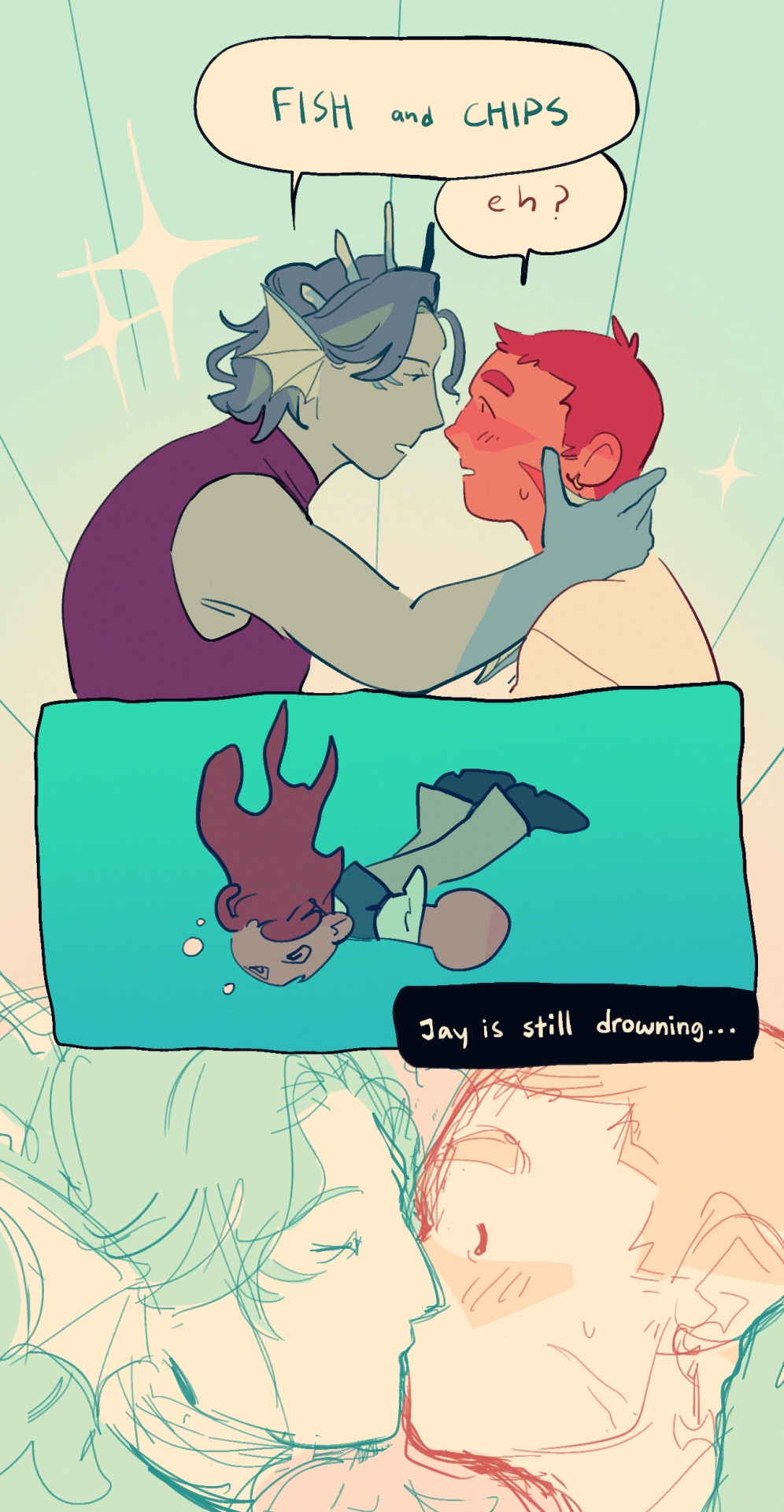
"this is regrettably the best kiss of your life, you understand?"
#that “you understand?” kills me everytime...#i love how high condis voice got during this bit its so fkn funny DHASHGFSFGHASFhg#hi yes have the inevitable ep21 crit kiss piece except i watched ep53 today and am so 😀 im so 😀 damn i m so 😀#i love eps where they just go through so many different gimmick rooms its so fun its so fun when its not so painful 😀#happy valentines too ig#just roll with it#jrwi riptide#gillion tidestrider#jrwi chip#jay ferin#jrwi fish and chips#my art#i had a bit of a meltdown over gill through uhm... 1-3am today and i just hm#sorry to everyone in the mayors QAC uhm im not really sorry but like sorry if you could hear every msg ping uhm yeah#it was like hours of me sobbing to myself in the interests channel and it was really good for my mental health ngl like its really therapeu#-tic to just scream abt a blorbo all night#and i ended up dreaming abt infodumping to one of my brothers friends of all ppl n i got so intense abt how much i love marshall john n my#brother came into the room and dragged his friend out 😭😭😭 i just wanted to ramble abt the himbo pls.....#my walls of tags are so consistent... only consistent thing abt this fkn blog smh.
2K notes
·
View notes
Text
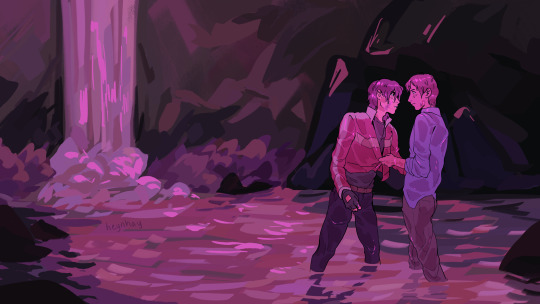
scene from where the apple falls by @jupiters-junipers :-) wholeheartedly recommend any and all of her work
#klance#voltron#vld#ok now time to freak it in the tags#to be honest i saw colleen blogging her read of New and the two of us went back and forth in dms for like 20 mins straight#abt all the things we like abt europas work#and i was like okay i have to assert my membership in the europa fan club too hang on#ive had 'draw europa report scene' in my art to-do file for months but thbeyre all so good#i couldnt choose!#due west is obviously The One the flagship#but they all deserve love....#i tell you to be honest im a coward i usually avoid any unfinished fics cause i like to binge but for europas work its simply worth it#anyway i envy you if you dont know who im talking abt bc that means u get to read her work for the first time...sighs dreamily#art#my art#ANYWAY THIS ONE IS SAD. EUROPA UNDERSCORE REPORT YOU ARE A TWISTED INDIVUDAL (affectionate)#im putting my life in ur hands with those happy ending tags.... save me help me..... auuughghh...
693 notes
·
View notes
Text

mirage chilling wit the kagome veggie juice pack
#ULTRAKILL#mirage ultrakill#ultrakill mirage#MS PAINT#ALL ART#FANDOM ART#DOODLE#NO COLOUR#First Post!#THE GEIGER COUNTER#SMALL CAPTION#TAG YAP#EDIT FOR TAG TYPO#as a hafu folk mirage makes me very happy#i dont know why but she just does#it just makes me so inexplicably happy to draw mirage enjoying japanese goodies like how i did when i was small :-)#the purple kagome juice packet was (and still is) my favourite#so she has that here!#also mirage lowkey has that "hafu but cant speak japanese for shit” energy#SHES JUST LIKE ME......... FR FR..... /ref#i can feel it#god i literally just got this game last friday im already so attached to it#this is how you know its peak#go my autism /ij#i love my girlfriend picture meme but its the ultrakill logo#what the jib i talked so much#after a while this will be this blog's pfp >O<!! i think its cute#a lil nervous posting this but oh well i wont die#famous last words#if anything is wrong with this please be nice!
267 notes
·
View notes
Text
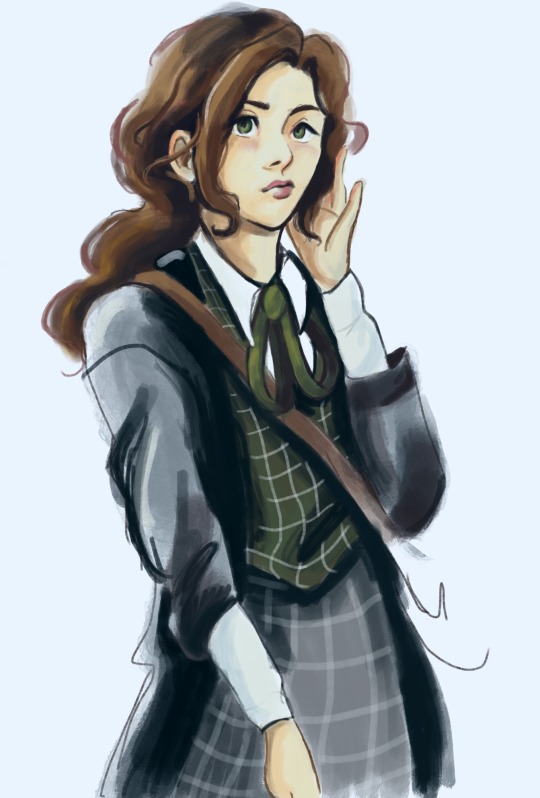
my first attempt at digital art (never again🥲) for mctober💘
Eloise Babbit✨
slytherin
5th year
favorite subjects: arithmancy & ancient runes
least favorite subject: beasts (animals make her nervous🥲)
hobbies: reading & thinking (IT’S A HOBBY OKAY??)
#if u read my fic maybe u know why animals make her nervous🥲#also…if you are the angel who left me an essay comment on my last chapter today just know I love you🥹🥹🥹🥹🥹#when I started posting my fic in January I NEVER EXPECTED PEOPLE TO READ IT !!!!!!!!!!!!!😳 but it makes me so happy#that so many people do🥹🫶 I know it’s a crazy story and doesn’t follow the game at all#so to hear these things and to catch all of the little foreshadowing things I’ve been hinting at this whole time?????????#😳💘#anyways I’m still a digital art disliker (I like seeing it but not making it)#but I wanted to try it out and this is my art documentation blog🫶#im going to be WAY less active these days as well#SO IF I MISS THINGS (WHICH I WILL) PLEASE KNOW I AM SAD I MISSED THEM😔😔😔😔#hogwarts legacy#hogwarts legacy fanart#hphl#hogwarts legacy mc#hogwarts legacy oc#eloise babbit#mctober2024#also with mctober I will post drawinfs but nothing elaborate like the amazing ones I’ve already seen#hope you like these anyways🙏💓
214 notes
·
View notes
Text
patience being tested. being forced by a bizarre unfortunate situation to adhere to university requirement technicality by taking this simple basic elementary "introduction to environmental history" class.
this class is from facilitators/program which do, like, "history of the American frontier" or "history of fishing and hunting" and still basically subscribe to that old-school twentieth-century idealization and celebration of characters like Teddy Roosevelt and reverence for a mythical arc-of-history-bent-towards-justice narrative of the often-clumsy but ultimately-benevolent US federal government and its mission to "save nature" through the miracle of "sustained yield," while heroic federal land management agencies and "heritage" institutions lead to way, staffed by exceptional individuals (appeals to nostalgia for the frontier and an imagined landscape of the American West; ego-stroking appeals to flattering self-image that center the environmentalist or academic). where they invoke, y'know, ideas like "ecology is important because don't you enjoy cross-country skiing in The Woods with your niece and nephew? don't you like hunting and fishing?" which makes it feel like a time capsule of appeals and discourses from the 1970s. and it invokes concept of "untouched wilderness" (while eliding scale of historical Indigenous environmental relationships and current ongoing colonial violence/extractivism). but just ever-so-slightly updated with a little bit of chic twenty-first-century flair like a superficial land acknowledgement or a reference to "labor histories" or "history from below," which is extra aggravating when the old ideologies/institutions are still in power but they're muddying the water and diluting the language/frameworks (it's been strange, watching words like "multispecies" and "Anthropocene" over the years slowly but surely show-up on the posters, fliers, course descriptions, by now even appearing adjacent to the agri-business and resource extraction feeder programs, like a recuperation or appropriation.) even from a humanities angle, it's still, they're talking at me like "You probably didn't know this, but environmental history is actually pretty entangled with political and social events. In fact, we can synthesize sources and glean environmental info from wacky places like workers' rolls in factories, ship's logs, and poetry from the era." and i'm nodding like YEP.
the first homework assignment is respond to this: "Define and describe 'the Anthropocene'. Do you think 'the Anthropocene' is a useful concept? Why or why not?" Respond in 300 words.
so for fun, right now in class, going to see how fast i can pull up discussion of Anthropocene-as-concept solely from my old posts on this microblogging site.
---
ok, found some
---
I think that the danger in any universal narrative or epoch or principle is exactly that it can itself become a colonizing force. [...] I’m suspicious of the Anthropocene as concept for the very reason that it subsumes so many peoples, nations, histories, geographies, political orders. For that reason, I think ideas like the Anthropocene can be a useful short-hand for a cluster of tangible things going on with the Earth at the moment, but we have to be very careful about how fluid and dynamic ideas become concretized into hegemonic principles in the hands of researchers, policymakers, and politicians. There’s so much diversity in histories and experiences and environmental realities even between relatively linked geographies here in Canada [...]. Imagine what happens when we try to do that on a global scale - and a lot of euro-western Anthropocene, climate change and resilience research risks doing that - eliding local specificities and appropriating knowledge to serve a broader euro-western narrative without attending to the inherent colonial and imperial realities of science and policy processes, or even attending to the ways that colonial capitalist expansion has created these environmental crises to begin with. While we, as a collective humanity, are struggling with the realities of the Anthropocene, it is dangerous to erase the specific histories, power-relations, political orders that created the crisis to begin with. So, I’m glad that a robust critique of the Anthropocene as a concept is emerging.
Text by: Words of Zoe Todd, as interviewed and transcribed by Caroline Picard. “The Future is Elastic (But it Depends): An Interview with Zoe Todd.” 23 August 2016.
---
---
---
The Great Acceleration is the latest in a series of human-driven planetary changes that constitute what a rising chorus of scientists, social scientists, and humanists have labeled the Anthropocene - a new Age of Humans. [...] But what the Anthropocene label masks, and what the litany of graphs documenting the Great Acceleration hide, is a history of racial oppression and violence, along with wealth inequality, that has built and sustained engines of economic growth and consumption over the last four centuries. [...] The plantation, Sidney Mintz long ago observed, was a “synthesis of field and factory,” an agro-industrial system of enterprise [...]. Plantation legacies, along with accompanying strategies of survival and resistance, dwell in the racialized geographies of the United States’ and Brazil’s prison systems. They surface in the inequitable toxic burdens experienced by impoverished communities of color in places like Cancer Alley, an industrial corridor of petrochemical plants running along the Mississippi River from New Orleans to Baton Rouge, where cotton was once king. And they appear in patterns of foreign direct investment and debt servitude that structure many land deals in the Caribbean, Brazil, and sub-Saharan Africa [...]. [C]limatologists and global change scientists from the University of London, propose instead 1610 as a date for the golden spike of the Anthropocene. The date marked a detectable global dip in carbon dioxide concentrations, precipitated, they argue, by the death of nearly 50 million indigenous human inhabitants [...]. The degradation of soils in the tobacco and cotton-growing regions in the American South, or in the sugarcane growing fields of many Caribbean islands, for example, was a consequence of an economic and social system that inflicted violence upon the land and the people enslaved to work it. Such violent histories are not so readily evident in genealogies that date the Anthropocene’s emergence to the Neolithic Revolution 12,000 years ago, the onset of Europe’s industrial revolution circa 1800, or the Trinity nuclear test of 1945. Sugarcane plantations were already prevalent throughout the Mediterranean basin during the late middle ages. But it was during the early modern era, and specifically in the Caribbean, where the intersection of emerging proto-capitalist economic models based on migratory forced labor (first indentured servitude, and later slavery), intensive land usage, globalized commerce, and colonial regimes sustained on the basis of relentless racialized violence, gave rise to the transformative models of plantations that reshaped the lives and livelihoods of human and non-human beings on a planetary scale. [...] We might, following the lead of science studies scholar Donna Haraway and anthropologist Anna Tsing, more aptly designate this era the Plantationocene. [...] It is also an invitation to see, in the words of geographer Laura Pulido, “the Anthropocene as a racial process,” one that has and will continue to produce “racially uneven vulnerability and death." [...] And how have such material transformations sustained global flows of knowledge and capital that continue to reproduce the plantation in enduring ways?
Text by: Sophie Sapp Moore, Monique Allewaert, Pablo F. Gomez, and Gregg Mitman. "Plantation Legacies." Edge Effects. 22 January 2019. Updated 15 May 2021. [Bold emphasis added by me.]
---
---
---
Geologists and other scientists will fight over [the definition of the beginning start-date of the Anthropocene] in scientific language, seeking traces of carbon dioxide that index the worst offenses of European empire which rent and violated the flesh, bodies, and governance structures of Indigenous and other sovereign peoples in the name of gold, lumber, trade, land, and power. [...] The stories we tell about the origins of the Anthropocene implicate how we understand the relations we have with our surrounds. In other words, the naming of the Anthropocene epoch and its start date have implications not just for how we understand the world, but this understanding will have material consequences, consequences that affect body and land.
Text by: Heather Davis and Zoe Todd. On the Importance of a Date, or Decolonizing the Anthropocene. ACME An International Journal for Critical Geographies. December 2017. [Bold emphasis added by me.]
---
---
---
From Aime and Suzanne Cesaire, C. L. R. James, Claudia Jones, Eduoard Glissant, through Sylvia Wynter, Christina Sharpe, and so many others, critical anticolonial and race theory has been written from the specific histories that marked the Black Atlantic. [...] Glissant also reminds us, secondly, of how cunning the absorptive powers of [...] liberal capitalism are - how quickly specific relations are remade as relations-erasing universal abstractions. [...] This absorptive, relations-erasing universalism is especially apparent in some contemporary discourses of […] liberalism and climate collapse - what some call the Anthropocene - especially those that anchor the crisis in a general Human calamity which, as Sylvia Wynter has noted, is merely the name of an overdetermined and specific [White] European man. […] [T]he condition of creating this new common European world was the destruction of a multitude of existing black and brown worlds. The tsunami of colonialism was not seen as affecting humanity, but [...] these specific people. They were specific - what happened to them may have been necessary, regrettable, intentional, accidental - but it is always them. It is only when these ancestral histories became present for some, for those who had long benefitted from the dispossession [...], that suddenly the problem is all of us, as human catastrophe.
Text by: Elizabeth Povinelli. “The Ancestral Present of Oceanic Illusions: Connected and Differentiated in Late Toxic Liberalism.” e-flux Journal Issue #112. October 2020.
---
The narrative arc [of White "liberal humanism"] [...] is often told as a kind of European coming-of-age story. […] The Anthropocene discourse follows the same coming-of-age [...] script, searching for a material origin story that would explain the newly identified trajectory of the Anthropos […]. Sylvia Wynter, W.E.B. DuBois, and Achille Mbembe all showed how that genealogy of [White subjecthood] was [...] articulated through sixteenth- through nineteenth-century [historiographies and discourses] in the context of colonialism, [...] as well as forming the material praxis of their rearrangement (through mining, ecological rearrangements and extractions, and forms of geologic displacements such as plantations, dams, fertilizers, crops, and introduction of “alien” animals). […] As Wynter (2000) commented, “The degradation of concrete humans, that was/is the price of empire, of the kind of [Eurocentric epistemology] that underlies it” (154).
Text by: Kathryn Yusoff. “The Inhumanities.” Annals of the American Association of Geographers, Volume 11, Issue 3. November 2020.
---
---
---
As Yarimar Bonilla suggests in regard to post-Irma-and-Maria Puerto Rico, “vulnerability is not simply a product of natural conditions; it is a political state and a colonial condition.” Many in the Caribbean therefore speak about the coloniality of disaster, and the unnaturalness of these “natural” disasters [...]. Others describe this temporality by shifting [...] toward an idea of the Plantationocene [...]. As Moore and her colleagues write, “Plantation worlds, both past and present, offer a powerful reminder that environmental problems cannot be decoupled from histories of colonialism, capitalism, and racism that have made some human beings more vulnerable [...].” [W]e see that contemporary uneven socioecologies associated with the rise of the industrial world ["the Anthropocene"] are based [...] also on the racialized denial and foreshortening of life for the sacrificial majority of black, brown, and Indigenous people and their relegation to the “sacrifice zones” of extractive industry. [...] [A]ny appropriate response to the contemporary climate emergency must first appreciate its foundations in the past history of the violent, coercive, transatlantic system of plantation slavery; in the present global uneven development, antiblackness, and border regimes that shape human vulnerability [...] that continues to influence who has access to resources, safety, and preferable ecologies [...] and who will be relegated to the “plantation archipelagoes” (as Sylvia Wynter called them) [...].
Text by: Mimi Sheller. “Thinking Beyond Coloniality: Toward Radical Caribbean Futures.” Small Axe (2021), 25 (2 (65)), pages 169-170. Published 1 July 2021. [Bold emphasis added by me.]
---
---
---
Indigenous genocide and removal from land and enslavement are prerequisites for power becoming operationalized in premodernity [...]; it was/is a means to operationalize extraction (therefore race should be considered as foundational rather than as periphery to the production of those structures and of global space). [...] Wynter suggests that we […] consider 1452 as the beginning of the New World, as African slaves are put to work on the first plantations on the Portuguese island of Madeira, initiating the “sugar-slave” complex - a massive replantation of ecologies and forced relocation of people […]. Wynter argues that the invention of the figure of Man in 1492 as the Portuguese [and Spanish] travel to the Americas instigates at the same time “a refiguring of humanness” in the idea of race. [...] The natal moment of the 1800 Industrial Revolution, […] [apparently] locates Anthropocene origination in […] the "new" metabolisms of technology and matter enabled by the combination of fossil fuels, new engines, and the world as market. […] The racialization of epistemologies of life and nonlife is important to note here […]. While [this industrialization in the nineteenth century] […] undoubtedly transformed the atmosphere with […] coal, the creation of another kind of weather had already established its salient forms in the mine and on the plantation. Paying attention to the prehistory of capital and its bodily labor, both within coal cultures and on plantations that literally put “sugar in the bowl” (as Nina Simone sings) […]. The new modes of material accumulation and production in the Industrial Revolution are relational to and dependent on their preproductive forms in slavery […]. In 1833, Parliament finally abolished slavery in the British Caribbean, and the taxpayer payout of £20 million in “compensation” [paid by the government to slave owners for their lost "property"] built the material, geophysical (railways, mines, factories), and imperial infrastructures of Britain and its colonial enterprises and empire. [...] A significant proportion of funds were invested in the railway system connecting London and Birmingham (home of cotton production and […] manufacturing for plantations), Cambridge and Oxford, and Wales and the Midlands (for coal). Insurance companies flourished [...]. The slave-sugar-coal nexus both substantially enriched Britain and made it possible for it to transition into a colonial industrialized power […]. The slave trade […] fashioned the economic conditions (and institutions, such as the insurance and finance industries) for industrialization.
Text by: Kathryn Yusoff. "White Utopia/Black Inferno: Life on a Geologic Spike". e-flux Journal Issue #97. February 2019. [Bold emphasis added by me.]
#sorry for being mean#instructor makes podcasts about cowboys HELP ME#and he recently won a New Business award for his startup magazine covering Democrat party politics in local area HELP#so hes constantly performing this like dance between new hip beerfest winebar coolness and oldfashioned masculinity#but hes in charge of the certificate program so i have to just shut up and keep my head down for approximately one year#his email address is almost identical to mine and invokes enviro history terms but i made mine long before when i was ten years old#so i could log in to fieldherpforum dot com to talk about enviro history of distribution range changes in local reptiles and amphibians#sir if you read my blog then i apologize ive had a long year#and i cant do anything to escape i am disabled i am constantly sick im working fulltime i have NO family i have NO resources#i took all of this schools graduate level enviro history courses and seminars years ago and ran the geography and enviro hist club#but then left in final semester because sudden hospitalization and crippled and disabled which led to homelessness#which means that as far as any profession or school is concerned im nobody im a retail employee#i was doing conference paper revisions while sleeping on concrete vomiting walking around on my cane to find outdoor wifi#and im not kidding the MONTH i got back into a house and was like ok going back to finish the semester the school had#put my whole degree program and department in moratorium from lack of funding#and so required starting some stuff from scratch and now feel like a hostage with debt or worsening health that could pounce any moment#to even get back in current program i was working sixteen hours a day to pay old library fines and had to delicately back out of workplace#where manager was straight up violently physically abusive to her vulnerable employees and threatened retaliation#like an emotional torturer the likes of which i thought existed only in cartoons#and the week i filed for student aid a massive storm had knocked out electricity for days and i was clearing fallen tree debris#and then sitting in the dark in my room between job shifts no music no phone no food with my fingers crossed and i consider it a miracle#sorry dont mean to dramatize or draw attention to myself#so actually im happy you and i are alive
134 notes
·
View notes
Text


happy birthday cross !! it's always a delight to see your genuine smile, and i mean it when i say it's an absolute treasure to me !!
(meme src)
#10/10#cross!sans#self insert#mblue art#CM#i'm thankful i get to witness you smile like that !!#i hope you get to experience more things to smile and be happy for !!#you deserve cozy rest days with warm mugs of hot choco and delicious tacos- regular or those dessert ones w icecream in em#(i'd like to believe i always give him the same chocolate mousse cake i got for my birthday that one time <333)#(RRRAAAAH ILY POOKIEBEAR !! /insert letsgo meme/)#(syeth idc idc!! im supposed to be unapologetically simping and selfshipping on MY blog bro)#(screw anxiety i'm blocking whoever's being weird on ANY of my posts bruh)#(i'll be the sappiest mf on these posts abt my faves im already this 🤏 close to screaming abt lust being my wife on xtwt. ANYWAY)#(i may be losing the idgaf war erryday but i am WINNING when it comes to selfshipping with my fictional faves. to be cringe is to be free.)
340 notes
·
View notes
Text
you know while I'm at it!! I'm sick of people not letting Rlain stand on his own as a character. of course his whole thing in WaT (and to a certain extend RoW) is that he's finally found acceptance and a place he fits in with Renarin, and I love that! I love rlainarin as much as the next person!! but it's driving me up the walls bonkers how the majority of the fan made media I see about him is solely in the context of their relationship. like can we please get more love and appreciation for him as a character? or does everyone else just love him because He's Gay ??
#before anyone starts twisting my words id like to reiterate that i love renarin and rlain thats like half my blog#but rlain is an individual with his own arc and feelings and moments and thats important#sooooo many people will go to the ends of the earth to acknowledge moash and the prejudice he faces (which i support bc im pro moash)#but nobody does the same for Rlain#like why?? because he isn't a “bad guy”?#newsflash! people fighting odium can also be victims !!#you can still be kind and honorable and what have you and face racsim lmao like come on guys#and im so happy we finally get the canon gayness but can this please mean we focus on him more as a character#thanks! anyway#wat spoilers#wind and truth#stormlight 5 spoilers#wind and truth spoilers#rlain#rlainarin
129 notes
·
View notes
Text
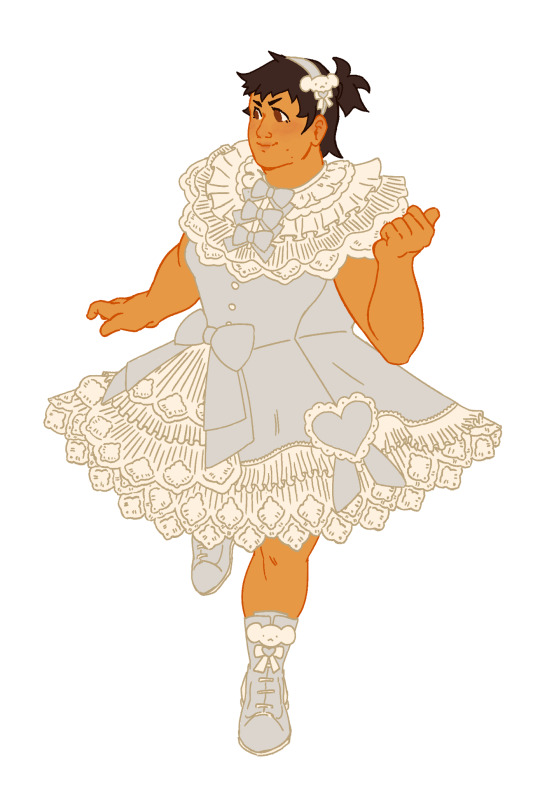
this was the most fun ive had drawing something in like a week please enjoy her!! the dress is from this blog here ^_^
#drawing lace is so hard oh my god but its worth it and it gets fun after a while#tgaa#ryunosuke naruhodo#ryuunosuke naruhodou#she turned out so good im so happy w her#i love when i draw a ryuu im truly proud of like Fuck yes there she is! looking like herself#genderbends are fun…. you people are so correct she makes an excellent woman#i think my official hc is still ryuunosuke cis guy who eventually realizes he doesnt really see himself as any gender—#—but keeps using he/him bc its easy and he doesnt really jive with anything else#but also on the side i think transfem ryu or just a genderbend au is so fun#so anyway yea#i realized that i can draw whatever i want whenever i want for any reason so have girlnosuke#woman kazuma also in lolita might come soon. we’ll seeeee#or maybe masc ryuu in one of the fancy suits on that blog#she/herlock sholmes maybe? i have a fem hmmk draft in my docs rn lmao#regardless. i want a chuunosuke headband now#my art#the great ace attorney
55 notes
·
View notes
Text
I've been seeing this a lot lately, but a little while ago I mentioned something to do with disability in a discord and someone asked me if I was a "spoonie". Not if I was disabled, but a spoonie. I need y’all to fucking get it into ur heads that disabled is not a dirty word. You can use the term spoonie for yourself all you want, but the second you start imposing it on other people and generally using it in place of the word "disabled", its just another woo-woo euphemism that seeks to soften and make comfortable the vocabulary and concept of disability.
Like at a certain point it becomes clear that a lot of people now are using “spoonie” in the same damn way as “differently abled” or "handicapable". The origin and intent of the term become moot within that usage because what it serves to do is invoke disability euphemistically, obfuscating and softening it in service of compulsory normative able-bodymindedness.
If you want to use that term for yourself, fine. Have fun. It doesn't have these same connotations when its used as a self identifier rather than as a replacement for the word "disabled". But stop applying it to others in place of "disabled" I’m so fucking serious.
#sorry im just really annoyed about this#like i really genuinely do not have an issue with teh use of the term on oneself. do whatever makes you happy yk#but when you start using it in place of disabled for other people or just in general. thats when we have a problem.#this is on account of the fact that words mean things and also have implications#ceci says stuff#disability#i feel like tagging that is kicking the hornets nest but i mostly want to be able to find it on my own blog so.#100#200
231 notes
·
View notes
Text
can't wait til I start this stupid job so I won't have to be doing commissions all the fucking time to buy groceries, this shut sucks the joy out of art so much. I wanna be drawing ultrakill stuff & personal art & doing crafts & reading books but every time I sit down to do something for me I'm thinking about the fact that I should be doing commissions. I'm so glad I didn't go into art as an actual career, I would hate myself so much forever
#i just want art to be able to be a hobby again aaaaa#i can talk about it here bc nobody who's commissioning me knows this is my blog. ive gotten like 2 commissions off tumblr ever lmfao#and tbh i am tired of pretending to be enthusiastic about drawing other peoples ocs. im so tired of customer service voice#im not gonna lie most of the time i do not care about your blorbo. i'm glad you're having fun im happy for u but i just need money#im happy you like my art enough to pay for it but im so TIRED#being self employed sucks like yeah i can choose my own hours but im also always thinking 'i could be working now' and i HATE IT#i don't wanna make it sound like i'm gonna starve or anything I can ask my parents for money if i really need to#im not like in genuine poverty or the biggest victim of capitalism here i just have a family that's deeply unpleasant to interact with#but im starting a half-time job at the university physics department at the end of the month and that'll be enough to cover Being Alive!!!#and will also hopefully be something i am genuinely interested in & enjoy with people who seem relatively cool#(they're gonna let me into the machine shop!! im gonna get to build things!! they were genuinely interested in my robotics experience!!)#so once art stops being the Thing Temporarily Feeding Me i'm hoping i'll be able to draw more fun stuff again. & maybe even enjoy comms#it's somehow easier to be enthusiastic about commissions when i know the money will be going to buy a Cool Sword instead of food
49 notes
·
View notes
Text

A companion piece for my first @viktuuri-week piece because we can't have Yuuri without Viktor, now can we?
Credit to J XIV / Jesa Padayachy on Musescore for the transcription of Duetto: Stammi Vicino, Non Te Ne Andare used.
#wdym i havent posted in almost 2 months? shhhhhh#this was a lot of fun except for the 4 hours of procrastinating that i did#i think the piece itself took like 1 or 2 hours at most#whoops#anyway tumblr user blended ice mentioned that the part of my yuuri piece visible in my blog icon kinda looks like viktors eye colour#so its like yuuri reflected in his eye#and you know i COULD NOT pass up that opportunity and then this was born#so thank you besiyr for this JOY of a process#seriously theyre some of my simplest pieces to make but im always so happy with them#so thank you#also the highlights were everything to do i was THRIVING#yuri on ice#yoi#yuri on ice fanart#yoi fanart#fanart#art#arom antix art#arom antix#viktor nikiforov
280 notes
·
View notes
Note
Hello! Random whipper snipper! Share a WIP of your work!
ooh, with pleasure. six the musical araleyn fanart? in the year 2k24? more likely than you think xDD
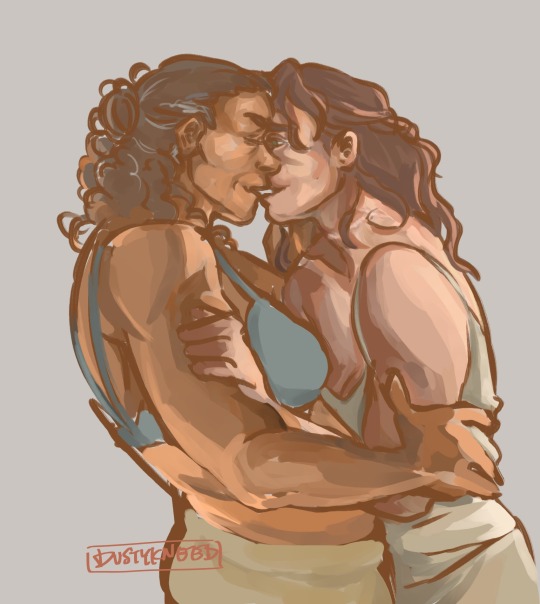
i realize this looks finished, but technically i'm still deciding whether to add a background or not lol. still, for the sake of sharing a proper WIP, here's a line or two from an araleyn brainworm WIP that i started reworking yesterday (mild tw for religious guilt and period-typical internalized homophobia from aragon's pov):
She remembers sharing her bed with Anne at Henry's behest, remembers the nights of tossing and turning and trying not to think about Anne asleep next to her-- remembers waking up to dark hair spilling across her pillow and the press of blood-warm bosoms against her own, softer than sin, as hot as the Devil, remembers lying still as death, mouthing prayers into the heat of Anne's neck like an act of penance.
#six the musical#six the musical fanart#six the musical araleyn#araleyn#araleyn fanart#i... cannot remember if it's fandom custom to use the full name tags#ah so it appears it is in fact fandom custom#catherine of aragon#catalina de aragon#anne boleyn#today we hazard a fleeting glimpse into the abtruse psyche of the dusty...#what other fandoms do they contain? wouldnt you like to know weather boy#well i mean honestly i don't know either but we'll find out as they rotate thru my conciousness#not trek#yeaaah i'm a spones girl (gender neutral) through and through. The more you know#and before you ask no this is not the og old married couple that went so hard i gained a type in ships forever after#though they are pretty up there in my blorbo rotation cycle#... on some level i may be yelling into the void with this one but no harm in that yeah?#but maybe the six fandom isn't as dead as i've been assuming. who knows? this is my self indulgent blog dammit#ill be self indulgent <33#also i keep forgetting it's pride month xDD my straight irls wish me happy pride and im always like OH Right nice yeah#but i haven't drawn these two in so long!! feels so good stretching the old married sapphics muscle again#dust writes#so happy about the vibe in this one ngl! theyre Soft ok. i like that very much. And also this aragon is so my type LMAO#really rambly tonight whoops. but i guess its the closest to a non-art post i can get to keep my page navigable? mm#...dammit now I'm thinking about araleyn in spones' roles. also i REALLY really should study#in hugely dire straits right now yall except i can't stop drawing/writing. whooooops.#sapphic#pride month#dust talks
66 notes
·
View notes
Text
i love sapphic people so much we’re all so beautiful and deserve so much love i love you i love you i love you
#hiiii!#it is emotion time for me#listened to some of my favorite songs after midnight#im very emotional#i love you so much#i hate how many people interact with this blog#because i want to grab your faces and tell you how much i hope you’re happy#and how badly i hope you feel loved#i hope you read my posts and feel the love in them#it’s for you#i wrapped it up in all my silly little words and hit post l#and now i just get to live hoping someone could feel it#because i desperately hope they do#because you’re just like me and im just like you and we both deserve SO much from this world#@ future me u can delete this but i hope you’re still this in love with the world when u do#@ people who read all these tags srry it’s late and im having a cry sesh and a lot of emotions#pls ignore me
360 notes
·
View notes
Text


cringefail late valentine's day posting some rushed kiss studies bc I worked like 36 of the past 72 hours yippee
and I STILL can't draw kissimg this shit haaard how yall do it 😭😭
#and let me tell ya!! kids will not!! stop!! fuckin!! bein!! sick as FUUUCK!!!!!#like just BE HEALTHY for a LITTLE BIT you little shits (affectionate but exhausted)#posted this earlier after trying to type out tags for like 4 hours to get it out on time and.#it didnt matter i posted to the Wrong Fucking Blog anyway#ik it's practice. almost put a period after 'and i STILL cant draw' lmao but. that's not nice#tag time bc fuck it. if im gon post this shit#trigun#trimax flavored but who cares#vash the stampede#nicholas d wolfwood#vash x wolfwood#vashwood#drawing#artists on tumblr#my art#fanart#ooooh using my skills for crimge bc it makes me happy ooooooh#yes i was too lazy to shade the arm. i'll do it later im fuckin tired#wip#i'll also say hey it's already leagues better than the last time i tried lol. prolly cause i used a ref#kudos to you if you recognize which reference pics i used. eat a chocolate for me if you do lol
143 notes
·
View notes
Text

28/01/2024
stars don't twinkle moon doesn't shine
big thanks to @nahrgles for finishing this for me after i hit a wall with colors bg and effects- chromatic aberration blew my fkn mind
pre edit transparent version under cut because i spent too much time cleaning it loll
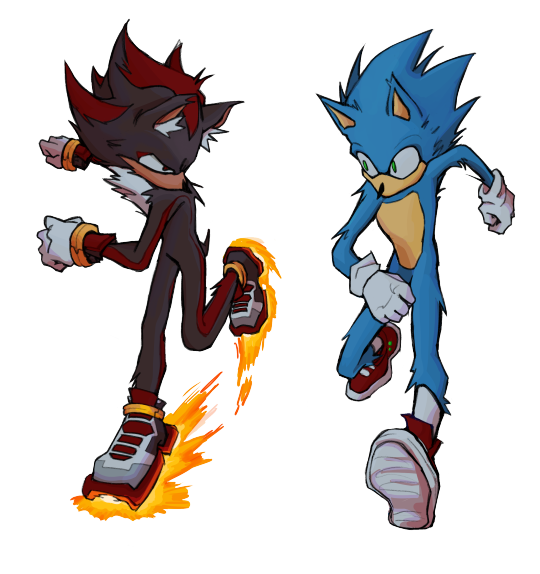
#sonic the hedgehog#sth#sonic#shadow the hedgehog#shadow#sonic adventure 2#sa2#admin draws#fanart#not intended as ship theyre kinda just There but like if ya wanna tag it i aint stopping you#never played sa2 myself but ive been insane about these two for saur long now and thats like half the reason i even finished this#finished sonic generations though and i replayed this fight like three times omgfgghgh its so fun. i love them so much#those who follow my main blog mightve seen the piece by a long deactivated artist that inspired this#queue spat it out just around the time i finished this#sitting down to complete a piece that i dont finish in one sitting is rare let alone 2 (it took 3) and im pretty happy with it#still not ttoooottally happy but you just gotta let mistakes be and not ruin ur perception of a thing thats on the whole. pretty good#ive still got a bg3 wip in the works but i might have to doodle these 2 for sanity rather than sitting down after a long day#of studying infectious diseases for a final. and then making myself work on something ive wrung of most of its initial creative dopamine#MORNING EDIT WOW. THAT TRAILER HUH. 20 YEARS OF SHADOW RETROSPECTIVE HOW WE FEELING.#BC I KNOW IM ON CLOUD NINE NOW
118 notes
·
View notes
Text

THANK YOU!
I can't believe 300 of y'all like my silly little blog/art! Thank you for sticking with me on this journey! Cheers!
#seriously thank you#you guys rock#can't believe this blog is over a year old now!#im so grateful so many of you like my art!#happy 300#me and my 300 goons#affectionately#Noé is dragging Vanitas somewhere#maybe a Café#or a tacky souvenir shop#vanitas no carte#the case study of vanitas#les memoires de vanitas#vnc#vanoé#vanitas#noé archiviste my love#noe archiviste#noe x vanitas#vanitas x noé#fanart#doodles#anime#noé archiviste#manga#my art <3#art
101 notes
·
View notes